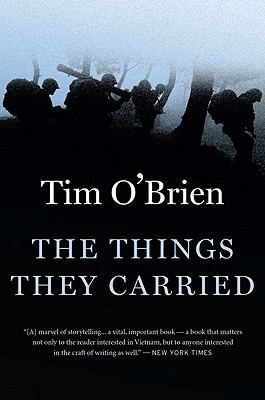Today is Veteran’s Day, and we at Eleventh Stack want to express our thanks and appreciation for all that our Military Service Members have done for us and this country. Free speech and the freedom of information is crucial to the Library’s mission, and we thank everyone who has served to protect those rights.
Maybe I shouldn’t admit this, but when my friend Kim of the excellently-named blog Sophisticated Dorkiness organized a The Things They Carried blogger read-along several years ago, I wanted no part of it. Even though Kim and I have similar literary tastes (we’re nonfiction junkies). I mean, if your literary diet is similar to mine, you’re not going to readily pick up a “war book.” Plus, with all I had going on in my life at the time, I wasn’t in the mood for “tough reading.”

Then someone else told me how remarkable this book was. And then someone else. And then my library had a display that mentioned The Things They Carried as being an American novel that everyone should read.
So, I caved.
And I’m so glad I did.
Yes, it’s a hard subject matter, one that most of us would like to avoid. Yes, there are some tough, heart-wrenching scenes and descriptions. But Tim O’Brien’s writing?
Absolutely breathtaking.
“To generalize about war is like generalizing about peace. Almost everything is true. Almost nothing is true. At its core, perhaps, war is just another name for death, and yet any soldier will tell you, if he tells the truth, that proximity to death brings with it a corresponding proximity to life. After a firefight, there is always the immense pleasure of aliveness. The trees are alive. The grass, the soil — everything. All around you things are purely living, and you among them, and the aliveness makes you tremble. You feel an intense, out-of-the-skin awareness of your living self — your truest self, the human being you want to be and then become by the force of wanting it. In the midst of evil you want to be a good man. You want decency. You want justice and courtesy and human concord, things you never knew you wanted. There is a kind of largeness to it, a kind of godliness. Though it’s odd, you’re never more alive than when you’re almost dead. You recognize what’s valuable. Freshly, as if for the first time, you love what’s best in yourself and in the world, all that might be lost.” (pg. 77-78)
Is that not spectacular?
I want to elaborate for a minute on this part: “Almost everything is true. Almost nothing is true. At its core, perhaps, war is just another name for death, and yet any soldier will tell you, if he tells the truth, that proximity to death brings with it a corresponding proximity to life.”
To me, those three sentences are the very core of this book. The Things They Carried has an element of mystery about it, because while it is billed as “A Work of Fiction by Tim O’Brien,” it reads very much like a memoir due in large part to O’Brien including himself as a character in the book. That leads the reader, including myself, to wonder how much of the story is true and how much isn’t.
O’Brien uses this technique brilliantly and, I believe, on purpose. I was born in spring 1969, so I draw my Vietnam references from books and movies, from Billy Joel’s “Goodnight Saigon” played (and sung) too loudly in a college dorm, from my uncle who returned forever changed. By using this literary device of purposefully not telling his reader what is true and what is not, O’Brien is making a similar statement on the nebulous and confusing times of which he writes.
Likewise, the “proximity to death bring[ing] a corresponding proximity to life” is also an intriguing line because, yes, there is so much death in this book but there is also so much life. The soldiers of Alpha Company are very much alive, even in their deaths as their memory lives on. And, as The Things They Carried makes clear, so are those who were left behind at home and those gone before their time. Being exposed to death so young has the effect of making one appreciate one’s life and the lives of those we love.
This is an incredibly powerful book, one that should — yes, absolutely — be required reading for every American. I may not have wanted to pick up The Things They Carried, but once I did, I could not put it down.
~ Melissa F.
Honor Our Veterans
Request The Things They CarriedMelissa F. loves short stories (especially ones that are interconnected), literary fiction, memoirs, poetry and creative nonfiction. A native of Philadelphia, Melissa loves everything about Pittsburgh, especially working for the Library as Manager of Grants and Research. A version of this post first appeared on February 28, 2014.
